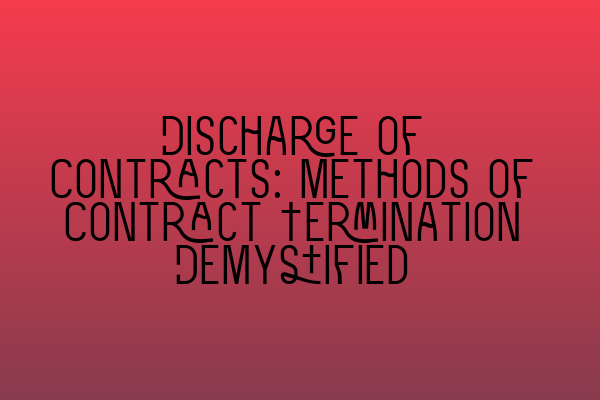Discharge of Contracts: Methods of Contract Termination Demystified
Contracts form the foundation of business relationships and legal obligations. They provide a framework for parties to agree upon terms and conditions, ensuring that both sides uphold their responsibilities. However, there may come a time when a contract needs to be terminated. This can happen for various reasons, such as completing the agreed-upon tasks or due to a breach of contract.
In this article, we will demystify the methods of contract termination, known as the discharge of contracts. Understanding the different ways contracts can be discharged is crucial for solicitors, legal professionals, and anyone involved in contractual agreements.
1. Performance
The most straightforward method of discharging a contract is through performance. When both parties fulfill their obligations as stipulated in the contract, it is considered fully performed, and the contract is discharged. This could involve delivering goods, rendering services, or making payments as agreed upon.
However, it is important to note that performance must strictly adhere to the terms of the contract. Any deviations could potentially lead to a breach of contract, leaving the party responsible for the breach liable for damages.
If you are preparing for the SQE contract law exams, make sure to practice with our SQE 1 Practice Exam Questions and SQE 1 Practice Mocks FLK1 FLK2 to solidify your understanding of contract performance.
2. Agreement
If both parties mutually agree to terminate the contract before performance is complete, they can discharge the contract through an agreement. This can occur when circumstances change, or when both parties realize that the contract is no longer viable or beneficial.
It is essential for the agreement to be clear and unambiguous. Parties should consider the inclusion of termination clauses or provisions in the initial contract to provide guidance on the process to be followed in case of termination.
To further enhance your knowledge of contract agreements and negotiations, consider enrolling in our SQE 2 Preparation Courses or SQE 1 Preparation Courses to develop essential contract law skills.
3. Frustration
Frustration occurs when unforeseen and exceptional circumstances arise, making it impossible to fulfill the contract. These circumstances must be beyond the control of the parties involved and were not reasonably anticipated at the time of entering into the contract.
Frustration acts as an automatic discharge of the contract, relieving both parties of their obligations. However, it is crucial to note that frustration is a complex area of law, and its application requires careful examination of the circumstances and legal precedents.
If you would like to explore further examples and cases related to frustration as a method of contract discharge, our experts recommend reviewing specific case studies and articles focusing on contract frustration.
4. Breach
When one party fails to fulfill their obligations under the contract, it is considered a breach. A breach of contract can occur through non-performance, defective performance, or anticipatory breach.
The injured party has the right to terminate the contract due to a material breach. However, in some cases, they may also have the option to seek damages or specific performance remedies.
To understand the legal implications of contract breaches and enhance your knowledge, consider researching case law examples and relevant legal resources in the field of contract law.
Conclusion
Discharge of contracts is a crucial aspect of contract law, and understanding the various methods of contract termination is essential for legal professionals and individuals involved in contractual agreements. By comprehending performance, agreement, frustration, and breach as methods of contract discharge, you can navigate the complexities of contract law more effectively.
For aspiring solicitors studying for the SQE contract law exams, it is vital to practice and test your knowledge through resources such as our SQE 1 Practice Exam Questions and SQE 1 Practice Mocks FLK1 FLK2 to ensure success.
Stay informed about upcoming SRA SQE exam dates by visiting our website: SRA SQE Exam Dates.
